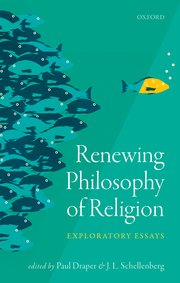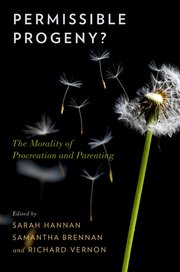|
A Guide To My Research
My focus tends focus on theoretical and practical questions about ethics, medicine, God, and the good life (or wellbeing). For example, I work on such topics as: "Do we know how happy we are?", "How many people should there be?", "How should physicians communicate risks to patients?", "Are science and religion compatible?" Although these are fundamentally philosophical questions, in my view, and so do not have purely scientific answers, I think that the way we answer them can and should be informed by the sciences. As a result, much of my work seeks to be in conversation with the sciences, including medicine, cognitive science, biology, and the science of happiness.
In biomedical ethics the bulk of work lies in a subfield that Elizabeth Harman calls creation ethics. Though traditionally focused on debates over abortion, creation ethics has more recently expanded to include questions such as 1) whether the drive to create "designer babies" is always morally problematic, 2) whether there is a right to create more than one child in a world of notable climate change, and 3) even the basic morality of bringing persons (or worlds) into existence. Although I am a pro-natalist who thinks that creating persons is typically permissible, given the harms of existence, I also think that it's important to reflect on challenges to procreation. Other bioethics topics that interest me include whether physicians should be permitted to refuse certain medical services on grounds of conscience, how detailed risk communication in medicine should be, and how to think more clearly and compassionately about disability and wellbeing.
Finally, I have an enduring interest in the philosophy of religion, the field that first drove me into philosophy. Most of my work here has concerned the relationship between faith and reason. This relationship is complex and careful readers will note that I have changed my mind on certain matters. For instance, I no longer recommend that theists consider Molinist responses to the challenge from religious diversity--which even in their universalist form now strike me as insensitive. I have further defended new versions of the problem of divine hiddenness, and the problem of religious diversity, that factor in the cognitive and evolutionary foundations of religion. At the same time, my assessment of the problem of from evil has also shifted. My view that procreation is typically permissible, despite the world's suffering and evil, reduces my confidence in many traditional arguments from evil against theism. Some papers are posted below. In due course I'll upload others, but in the meantime, feel free to ask me for a copy!
.______________________________________________________________________
Ethics
What’s Wrong With "You Say You’re Happy, But…" Reasoning? In the Oxford Handbook of Philosophy and Disability, edited by Adam Cureton and David Wasserman. Oxford University Press, 2019.
Disability-positive philosophers often note a troubling tendency to dismiss what disabled people say about their well-being. This chapter seeks to get clearer on why this tendency might be troubling. It argues that recent appeals to lived experience, testimonial injustice, and certain challenges to adaptive-preference reasoning do not fully explain what is wrong with questioning the happiness of disabled people. It then argues that common attempts to debunk the claim that disabled people are happy are worrisome because they threaten everyone’s well-being and are further challenged by an argument from moral risk.
https://philpapers.org/archive/MARWWW-13.pdf
_____________________________________________________________
Procreative Ethics and the Problem of Evil in Permissible Progeny? The Morality of Procreation and Parenting, Oxford University Press (2015), http://philpapers.org/archive/MARPEA-14.pdf
Many people think that the amount of evil and suffering we observe provides important and perhaps decisive evidence against the claim that a loving God created our world. Yet almost nobody worries about the ethics of human procreation. Can these attitudes be consistently maintained? This chapter argues that the most obvious attempts to justify a positive answer fail. The upshot is not that procreation is impermissible, but rather that we should either revise our beliefs about the severity of global arguments from evil or develop new and better defenses of human procreation. Although both possibilities are worthy of pursuit, this chapter focuses on the latter possibility.
______________________________________________________________
Conscientious Refusals and Reason-Giving, Bioethics, (2014), 28: 313–319 http://philpapers.org/archive/MARCRA-3.pdf
Some philosophers have argued for what I call the reason-giving requirement for conscientious refusal in reproductive healthcare. According to this requirement, healthcare practitioners who conscientiously object to administering standard forms of treatment must have arguments to back up their conscience, arguments that are purely public in character. I argue that such a requirement, though attractive in some ways, faces an overlooked epistemic problem: it is either too easy or too difficult to satisfy in standard cases. I close by briefly considering whether a version of the reason-giving requirement can be salvaged despite this important difficulty
______________________________________________________________________
Quality of Life Assessments, Cognitive Reliability, and Procreative Responsibility. Philosophy and Phenomenological Research (2014) http://philpapers.org/rec/MARQOL
Recent work in the psychology of happiness has led some to conclude that we are unreliable assessors of our lives and that skepticism about whether we are happy is a genuine possibility worth taking very seriously. I argue that such claims, if true, have worrisome implications for procreation. In particular, they show that skepticism about whether many if not most people are well positioned to create persons is a genuine possibility worth taking very seriously. This skeptical worry should not be confused with a related but much stronger version of the argument which says that all human lives are very bad and not worth starting. I criticize the latter stance, but take seriously the former stance and hope it can be answered in future work (before this can be done, however, optimists like myself need to know where the problems lie)
Thanks to whoever tweeted this for the compliment!!
.jpg)
Philosophy of Religion / Science and Religion
On the Socratic Injunction to Follow the Argument Where it Leads. Renewing Philosophy of Religion: Exploratory Essays ed., Paul Draper & J.L. Schellenberg, Oxford University Press. 2017.
This chapter examines a common objection to the philosophy of religion, namely, that it has not sufficiently embraced the injunction of Socrates to follow the argument where it leads. Although a general version of this charge is unfair, one emerging view in the field, which I call religious Mooreanism, nonetheless risks running contrary to the Socratic injunction. According to this view, many people can quickly, easily, and reasonably deflect all known philosophical challenges to their core religious outlooks, including arguments from evil. This chapter argues that, in addition to being in tension with the Socratic injunction, religious Mooreanism is less plausible than traditional Mooreanism and in any case has not been adequately defended.
https://philpapers.org/archive/MAROTS-14.pdf
I also have a much shorter blog entry on 'What Norms or Values Define Excellent Philosophy of Religion? Readers of the paper and the blog post should not assume that I take myself to be more Socratic than anyone else http://philosophyofreligion.org/?p=525307
___________________________________________________________________
Darwin and the Problem of Natural Nonbelief. Monist, July 2013 issue on Naturalizing Religious Belief
Problem one: why, if God designed the human mind, did it take so long for humans to develop theistic concepts and beliefs? Problem two: why would God use evolution to design the living world when the discovery of evolution would predictably contribute to so much nonbelief in God? Darwin was aware of such questions but failed to see their evidential significance for theism. This paper explores this significance. (Unlike some popular works on science and religion, the aim here is not to undermine or disrespect anyone's religious beliefs only to better understand some overlooked challenges for theism).
See here: http://philpapers.org/archive/MARDAT-7.pdf
______________________________________________________________________
Assessing the Third Way inThe Roots of Religion: Exploring the Cognitive Science of Religion, 2014, Ashgate Now Routledge, 2016)
Philosophers have long discussed the prospects of naturalism and theism. But I want to explore a third option here: namely, a kind of abstract generic religion without supernatural agency or God. This third option finds its most rigorous defense in the recent work of J.L. Schellenberg. My task will be to consider two questions: one cultural, the other epistemic. First, is the third way – which Schellenberg calls generic ultimism – likely to compete, culturally speaking, with traditional religion? Second, can the third way resist the argument from evil, as Schellenberg seems to suggest? I suggest that the answer is probably no on both fronts. My arguments make much use of recent work in cognitive science of religion.
_____________________________________________________________________
The Explanatory Challenge of Religious Diversity (with Jon Marsh) in Helen De Cruz & Ryan Nichols (eds.), Advances in Religion, Cognitive Science, and Experimental Philosophy. Bloomsbury 2016, 61-83.
The challenge from religious diversity is widely thought to be one of the most important challenges facing religious belief. Despite this consensus, however, many epistemologists think that standard versions of the challenge fail because they threaten to implicate many seemingly reasonable yet highly controversial non-religious beliefs. In light of this we develop an alternative, less discussed, diversity challenge that does not generalize. This challenge concerns why so much religious diversity exists in the first place given common religious, and in particular, theistic views. Although there are some interesting scientific explanations of such diversity, satisfying theistic explanations of its existence are still required.(PDF here)
______________________________________________________________
COVERS OF BOOKS MENTIONED ABOVE
   
____________________________________________________________
MUSIC
Finally, when I am not teaching or writing philosophy articles, I play guitar and write music for the Jason Marsh Band. While most bands have stable members, one musical style, and are only named after someone if they are the singer, mine is a bit different. I write the songs, play the guitars, and invite multiple guest singers (friends and professionals) from multiple styles (typically: rock, blues, country, & pop) to help me bring them to life: I also include a guitar-based instrumental on each album and occasionally try to shred. Our first record was "Try" (2016) followed by "Stubborn Attachments to Time, Pt.1" (2020), and "Southern Tales" (2022). To stream our stuff, go to spotify here apple music here or youtube music here.
While my music occasionally* connects up to my philosophical work, we're really just a rock band, albeit one that enjoys many musical styles.
  
*On my first album, "Try" (2016) *'Luminosity', 'The Gift of Life', and 'Happiness is a Game' connect up to some of my philosophical research. The first of these is about the decline of faith in Matthew Arnold's Dover Beach and about whether religious experience can overcome religious skepticism. The second is a life-affirming instrumental. The third is about the hedonic treadmill and the search for lasting happiness. Stubborn Attachments to Time (2020) is a musical exploration of childhood goods, midlife, impermanence, and other themes related to the passage of time. Southern tales is bluesier-rock release (2022) but also has some pop tunes.
|